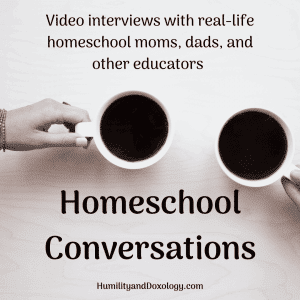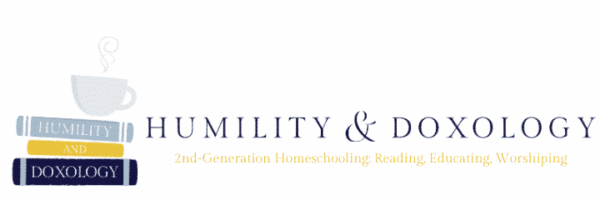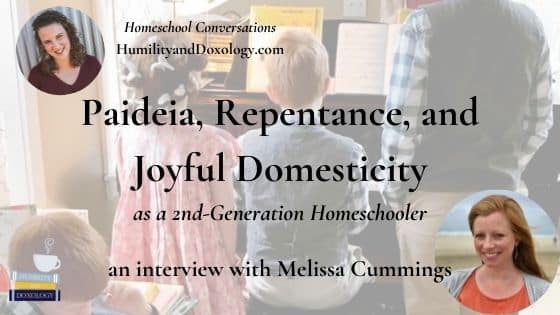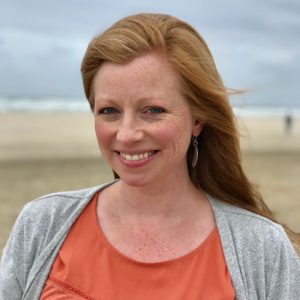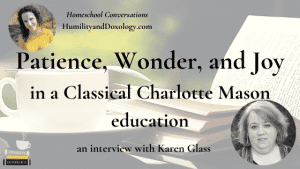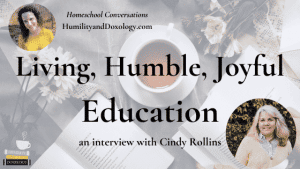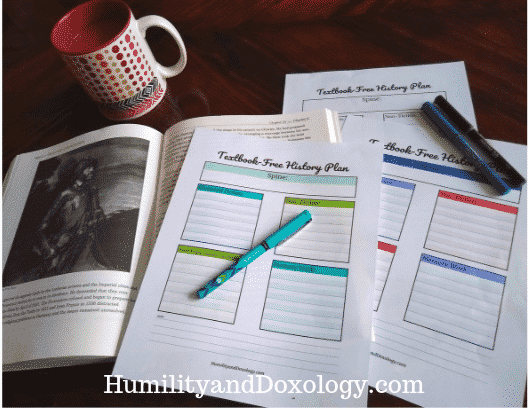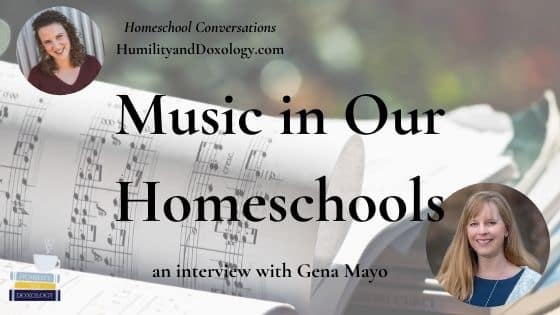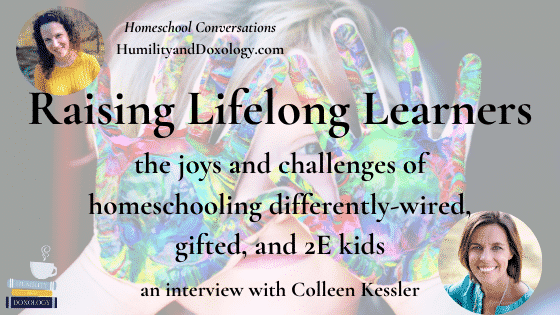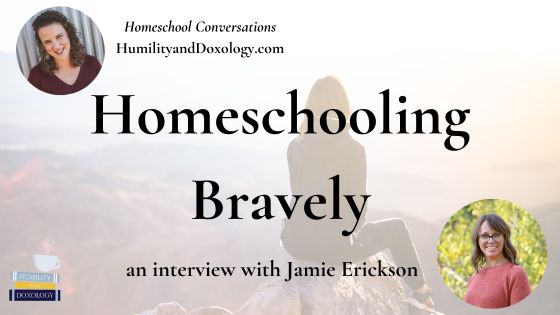Some of you may already know Melissa Cummings from her work coordinating the Paideia Northwest conference. Perhaps you’ve read her guest post here on HumilityandDoxology.com all about singing the Psalms with our little saints, or you’ve followed her journey learning the Psalms with her own little ones over on Instagram. But whether you know Melissa already or are meeting her for the first time today, you will love her winsome description of life as a second-generation homeschooling mom: raising her children in the nurture and admonition of the Lord, repenting on repeat, and reading lots of good books together.
Be sure to check out all the other interviews in our Homeschool Conversations series!
Watch the video. Listen to the podcast. Read the show notes. Share with your friends!
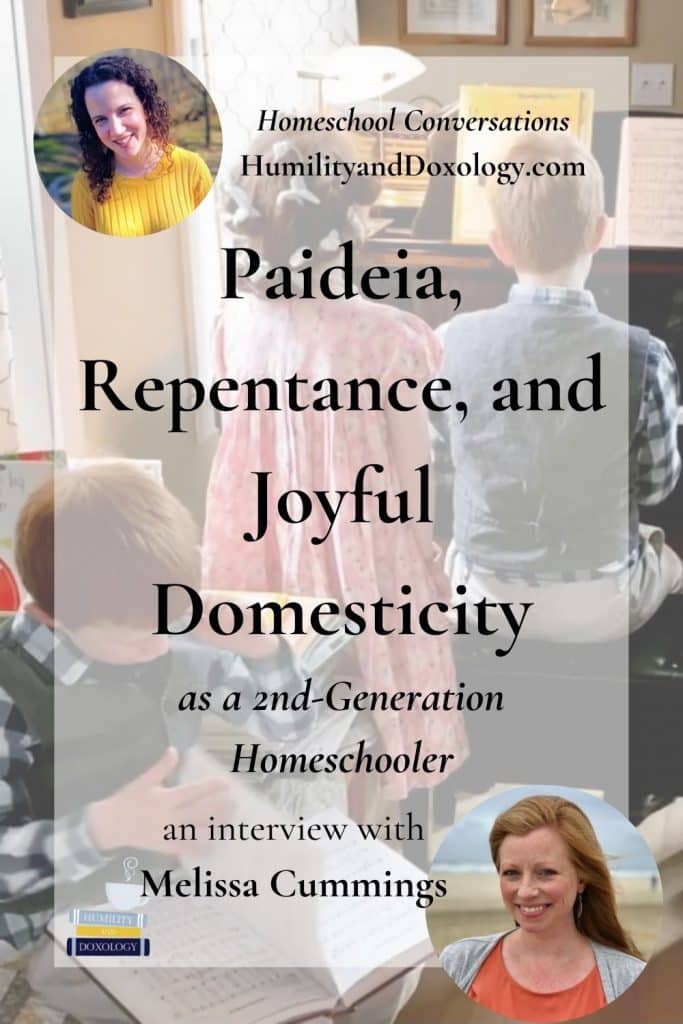
Who is Melissa Cummings?
Melissa Cummings, alongside husband Steven since 2007, is a second generation Christian homeschooling mother of 4 sons & a daughter (and nine other children ahead in glory). She holds a BA from Whitworth University, which she attended after a life of home education in a Christian family. Educating her five redheaded children at home in rural northeastern Washington is now her full time work including banter & beauty, culture & cooking, music & mayhem, reading & recreation, trivium & teatime, worship & wonder. And did we mention books? Lots and lots of books. She loves to encourage and connect with others through writing, by prayer, and in the annual ministry of planning, coordinating, & pulling off the Paideia Northwest conference for mamas raising kids for Christ. You can find her at JoyfulDomesticity.com or anywhere you connect with Paideia Northwest.
Watch my interview with Melissa Cummings
Prefer to listen to your content? Subscribe to Homeschool Conversations on Apple podcasts or wherever you get your podcasts so you don’t miss a single episode!


Amy: Hello, everyone. Today, we are joined by Melissa Cummings. Melissa, alongside her husband, Steven, since 2007, is a second-generation Christian homeschooling mother of four sons and a daughter, and nine other children ahead in glory. She holds a BA from Whitworth University which she attended after a life of home education in a Christian family.
Educating her five red-headed children at home in rural Northeastern Washington is now her full-time work, including banter and beauty, culture and cooking, music and mayhem, reading and recreation, trivium and tea time, worship and wonder. Did we mention books? As you can see behind her, if you’re watching the video, lots and lots of books. She loves to encourage and connect with others through writing, by prayer, and an annual ministry of planning, coordinating, and pulling off the Paideia Northwest conference for mamas raising kids for Christ. You can find Melissa at joyfuldomesticity.com or anywhere you connect with Paideia Northwest.
I’m so excited to get to talk to you in person now over video. We’ve been connecting over social media and Voxer and things, but this is fun.
Melissa: Yes, like teatime with a friend.
Melissa’s history with homeschooling
Amy: Perfect. Well, Melissa, could you just start by telling us a little bit about your history with homeschooling, and when and why you decided to homeschool your own children?
Melissa: I was homeschooled back in the pioneer days of the modern homeschooler movement. My mom was a little bit odd when she started homeschooling my brother and me. I have one brother who’s just a couple of years older than I am. He was in Christian Day School. He was bored. Even though it was a Christian school, it just wasn’t instilling all of the truth and beauty the parents thought could be inculcated into his childhood.
At third grade, they pulled him out and said, “We’re going to do this weird thing. We’re going to educate our kids ourselves.” Our grandparents thought, “What are you going to do with your children?” I got to experience the days when we couldn’t go grocery shopping until 2:30 PM because people would wonder why I wasn’t in school. The days when there were only three different curriculum to choose from, more or less. There were no homeschool conventions. There weren’t podcasts. This was pre-internet.
My mom was just on her own, shooting from the hip, and we loved it. We loved almost every minute of it. My brother and I grew up knowing that it was possible to educate your own kids, and knowing that it was possible also to be successfully home educated. Our story with being home educated was beautiful and successful. We both ended up being able to go to college straight from graduating homeschool high school, and just doing really well and loving it, and knowing that if God could provide such a way, we would do the same thing with our kids. He and I are both doing that now.
When I first met my husband in 2006, I told him, “I want to be a mom and I want to homeschool my kids.” He said, “I have no problem with that. We can try it.” When we had our first baby the next year after we got married, we started homeschooling right from the get-go. We started reading books, and singing, and pursuing all of those wonderful elements right from newborn-hood. That child is about to turn 13. We’ve been at it ever since.
Amy: So much of your story I relate to. I feel like we’re on opposite coasts but living very parallel experiences. I’m so thankful to the brave parents like ours, who were willing to really swim against the current in a way that we don’t, thankfully, have to quite as much today as homeschoolers. They were figuring things out with– a lot of the times, I know we would get the pre-published books from friends who were writing some of those early curriculums. They’d have all the typos and things, but there was something really beautiful about that too, to know that you were really forging this path that you were– It felt like an adventure and then to be able to experience that with our own children is such a delight.
I have to tell you a story about the grandparents. One of my grandmothers was really not so sure, I think all of my grandparents weren’t really so sure about this homeschooling thing, one of them, in particular. It was such a delight, later on, I think I was probably in high school by this time, someone in her local newspaper had written a scathing article against homeschooling or whatever. She actually wrote a letter to the editor defending homeschooling, and talking about how her opinion had completely changed. I always remember that as a fun moment.
Melissa: My grandparents definitely did the full 180 and became a proponents of home education. I have one grandparent still living, and she’s delighted that 10 of her great-grandchildren are being educated at home for the Lord. It’s definitely been a blessing.
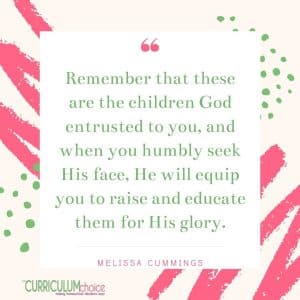
How Melissa’s homeschool is the same and different from her own homeschooled years
Amy: Well, Melissa, what are some ways that you see that your homeschool with your own children is similar or different from the homeschool experience you had growing up?
Melissa: I think one of the main blessings that I had growing up was realizing there wasn’t just one box to fit in. My mother and I have very different personalities. She had two children. We were very self-motivated, quiet, self-propelled students. I have five very energetic, not quiet children who, some of them, are more self-motivated than others. The dynamics of having more children, and boisterous, energetic, outspoken children is that they need more direction and structure than my childhood experience.
Thankfully, that works well with my personality. I like control. I like structure. I like lists. My children do well with that, so I’m grateful, but I think, back then, there weren’t, at least in our experience and in our circles on the West Coast, we didn’t have Charlotte Mason, and classical, and unschoolers, and open-and-go or all of these different categories. We were just homeschooled. That was only defining word for us. That was the label. I’ve grown up not liking labels, not being used to labels. That’s something that is similar.
I think Karen Glass, when I read Consider This, that was the first time I ever thought, “I might actually fit in the box.” How strange is that? Because that idea of fitting under a label is so foreign to me. Now, when I read Karen Glass’ work, especially any of her works, I feel seen. [chuckles] That’s something that’s a little bit both contrasted and similar. Having more children, having busier children, I think is the main difference with what I remember as a child, I did school on my own. My five kids well when– older children do all of their school together. It’s much more communal in that way.
Amy: I think it’s really interesting and helpful to hear your perspective on labels, because I think labels can be helpful when they give us a shorthand when we’re communicating to one another. It’s a way to build community or a way to help understand someone else, but they can be negative when they serve solely to divide us. Where it’s like, “Well, you don’t fit my 10 very specific niche parts of my subcategories of this homeschool approach; there’s something wrong with you,” or, “We can’t be friends,” or, “We don’t have much in common,” to really see that unity we have as homeschoolers, and then as Christian homeschoolers, of course, our unity in Christ is so important and valuable.
Again, not that labels aren’t helpful and useful in their place, but in a way to build relationship and community, not to separate us.
Melissa: I think one of the things I ended up finding was my mom got a catalog sent to her one time, randomly. I don’t remember what year it was, ’93 or ’94, and it had Logic Curriculum advertised. That was our first introduction to this idea of classical education, especially that could be applied in a home. For the next 15 years, I don’t know why, but I did not want to be classical. I did not want to have that title, that box. I didn’t want to be highfalutin and elite. I did not want to have Latin involved, and sentence diagramming? No, thank you. Now, I realize those are exactly the things that we do, and that we love.
It’s been very interesting to see how these preconceived, incorrect notions that I had of what a particular label was, I inadvertently stepped right into it, and was told, “Melissa, you do classically educate your children.” I thought, “No, there’s no way. There’s no way that’s what I do. I said, I wouldn’t do that,” and she’s right. I do, and we love it.
Growing into their family’s homeschool philosophy
Amy: Yes, as do I. You’ve already explained a little bit about how your homeschool philosophy has grown and changed over the years from those preconceived notions from your own childhood to what you do now, but are there any other ways where you see your understanding of homeschooling philosophy, or just approach to life as a homeschool family, that have grown and changed?
Melissa: Yes, I think one thing that has been interesting is mixing two different parent experiences. My husband was not homeschooled for his entire education. He was sometimes public schooled, sometimes private schooled, and occasionally homeschooled, so he’s definitely on board with me wanting to home educate our children, but he had an idea that it needed to be school in our home. Instead of being its entirely separate mode of education. We do math lessons, we have routines, but we don’t have a schedule. We don’t have recess, and things that are strict in that way, that are classroom-oriented.
When we first started homeschooling, we just had an idea between us that it needed to be more like a classroom. When we only had one child, that was very difficult for me to attain. I felt a sense of urgency that I needed to attain it, so I bought Shurley Grammar, and tried to figure out how to do a Shurley Grammar classroom setting, one-on-one with a child, and it didn’t work. Therefore, I thought I was failing. I thought I couldn’t do this homeschool thing with just one child. I slowly learned by being around more homeschoolers, and different types of homeschoolers, that it doesn’t need to be a classroom.
The kitchen table is our Mecca. It’s where we do almost everything. [chuckles] It’s lovely, and it’s homey. We have an atmosphere of loving, learning, and learning how to learn. I think that’s been the most important part. Learning to love learning, and learning how to learn, much more than implementing a specific classroom feeling. How many years ago was that? Seven years ago, eight years ago. Through those years, we’ve now grown into a family that pursues education outside of a classroom setting, on purpose, and just by habit. I think that’s definitely one of the ways that it’s morphed. Realizing that home education, the home, is the linchpin for us.
Amy: Isn’t that beautiful that we get to have this family culture that we’re focusing on the actual persons in our home, right? Who we are as a family, it’s something so much bigger, and almost harder in a way than just the academic part, but the academic part, it’s all intertwined. It’s not something that can be separated out or distinct, and it’s part of what makes it delightful, and fun, and part of that family culture, but it’s really something bigger that we’re doing.
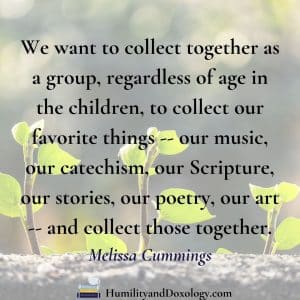
Melissa’s favorite parts of homeschooling
What are some of your favorite parts of homeschooling?
Melissa: Is it cheating to say the books?
Amy: Oh, no.
[laughter]
Melissa: I think the books are my favorite part, but really, I think it’s building relationships with my children. A lot of times it is based around the books, the read-alouds, and the history, the living books that we read related to history, or just the times that we have to build relationship over our faith. The idea of morning time, which in our home, we call collective.
We did call it morning time for a long time and recently realized, we didn’t always do it in the morning, and the time of day was not the defining characteristic of what we wanted from it. We want to collect together as a group, regardless of age in the children to collect our favorite things — our music, our catechism, our Scripture, our stories, our poetry, our art — and collect those together. We’ve been calling it collective. That’s, I think, our favorite thing. Again, it comes back to books, so being able to pursue relationship around those things.
Amy: Has there been a particular book that you’ve enjoyed recently in your collective time?
Melissa: We’re in the middle of a very different one, Strays by Remy Wilkins. Have you read it?
Amy: No.
Melissa: By Canon Press. It’s very different. It’s a little bit dark for my younger children, but the chapter titles are taken from A Mighty Fortress is our God, and so we’re this close to the end and seeing how it wraps up. That’s been a good one. It’s sparked some really interesting conversations, especially about the unseen world.
Amy: That sounds like one I might have to add to our family read-aloud collection. I bet all the ages would probably enjoy that.
Melissa: I think the other things that the other books that we connect the most over are hymnals. We do a lot of music, a lot of singing, especially singing of Psalms. That’s one of the main ways that we connect over a book that goes back to our faith. We practice a lot of Scripture that way, we memorize lots of Psalms, and we practice unity and diversity through whether we’re singing in unison or in harmony, and we get to develop a team, the children working together toward a goal.
Every month we have a psalm of the month, and a hymn of the month, and we work to memorize it, in however many parts of harmony we can, and to memorize the lyrics, to instill that beauty and that faith, deep in our souls and in our minds.
Amy: Our family loves to sing songs and hymns in our family worship, and we’ve done that every night for years, but I had never really made it a priority in our morning time routine until I had Cindy Rollins on the podcast, and I asked her, “What do you think is the most important thing we should include in our morning time?” She said, “Singing.” I was like, “Oh, okay.”
It just got me thinking and after that conversation, I’ve begun including a hymn or a psalm of the month in our morning as well. We bookend our day singing God’s word, singing together, and it has truly been a delight.
Some of the challenges of homeschooling
If books and singing hymns are some of the favorite parts of homeschooling, what would you say are some of the challenges and how have you sought to overcome those?
Melissa: That’s such a good question. [laughs] Depending on the day, I might have a different answer. I think it’s probably a very common struggle. Being together all day, every day, is a huge blessing, but it’s also tiresome at times. We are each other’s biggest cheerleaders, but also each other’s strongest foes, and it ought not necessarily be that way, but we have found it to be that way, and trying to figure out a way to overcome that is a continuous journey and it does change with the ages of the children.
My oldest being only 12, and the youngest being not quite 2, we still have a lot of, “Well, it’s room time. We need to go have some quiet time with books to get away from the tension that can come from the noise and the busyness,” so we do some of that. We do room time with the little ones. With the older ones, it’s run to the mailbox. We live out in the country, and our mailbox is a quarter mile away down a dirt road, and running to the mailbox and back is an excellent way to practice physical exertion. Especially for the boys, it’s huge in reorienting their attitude and in refocusing their mind. Getting out those wiggles, and the pent-up energy, because I don’t just want them sitting still at a desk doing book work all day.
Books are fantastic, but they’re not all there is. Being able to give them a physical break for their bodies, or a mental break for their brains, whether it’s through running, or through reading, those breaks away from each other, and away from mommy, [laughs] those are a gift. We’ve been able to see some encouraging results from trying to overcome the challenge that way.
I think another challenge for me has been realizing that I can have all my kids doing the same thing at the same time. With skilled subjects like writing or math, it is different. They’re not doing the same thing, but they can do the same subjects, so that I’m not trying to do Latin, and music, and math, and writing simultaneously, because I do multitask, but it’s difficult to multitask in that way. If I have the children all doing science, even if they’re doing different science, I can just have my mind in that mode, and be able to assist more effectively, and also I think more cheerfully, which is important,
Amy: That is so smart. I love that. Then your brain is able to be streamlined as well, instead of scattered in a million different directions we have-
Melissa: Especially with math, it helps.
Amy: Definitely. Piggybacking off of both of those things, I think I agree as a family of five, a wide age range, strong personalities, the best part of homeschooling is all being together and the worst part of homeschooling is all being together because our sins are all rubbing up against each other all the time, and we have found it difficult, especially with certain children, it’s really difficult for them to be doing their work in the presence of other people, and so we have little corners.
Everyone goes to their spaces, but then I’m listening to what you’re saying about all thinking of parenting all the subjects at one time and I’m like, “Oh, that sounds so amazing,” because it’s like, ” Okay, go answer this long division question here and help with this writing thing there,” and that can be frazzling as a mom, so I love that you found a way to streamline that and make it work for your family.
Melissa: It’s been a blessing, but I’m constantly growing. [laughs]
How Melissa pursues her own lifelong learning
Amy: Well, how are some of the ways that you pursue your own lifelong learning?
Melissa: I think one of the main things is teaching my children things I either don’t remember from my own education or that I never learned. I am now the history teacher in our co-op, and that’s not something we had growing up. We didn’t have a co-op. That wasn’t a thing, but we have a once-a-week classical Christian co-op where we meet with a handful of other families, and the moms, we each take a subject area. This year, I jumped into teaching history and I’ve never been a history teacher before. I’ve never even been a history buff.
I do not memorize lists of names, or dates, or timelines, timeline songs– even though music does help me memorize, I’ve never been good at memorizing timeline songs, so this was a new stretch for me and I love it. I absolutely love it. Teaching my children and other people’s children, a subject that is– history isn’t new to me, but approaching it this way and being able to teach it, is new to me.
That’s been a really great way to refresh my education. I know a lot of people talk about redeeming their education. I don’t feel like I need to redeem my childhood education. I think my parents did a lovely job, and God really blessed the fruit of their hands in that, but I get to refresh my education and I’m so grateful for that. I think the other thing is being connected with people like my friends at Schole Sisters. They constantly encourage me to be learning alongside my children, either when I’m not learning with my children. Having a reading challenge to do with them is a great way to pursue– what is it? Reading broadly, thinking deeply, applying faithfully, and–
Amy: I think so, [laughs]
Melissa: It’s something like that. That encouragement is really good for me. Then the webinars and podcasts that I can just pop in my earbuds. Those are a blessing too, to further my education with my children, and alongside my children and being unafraid to tell my children, “I don’t know,” when they ask a question. I don’t just say, ” Well, I’m not sure,” I say, ” I don’t know. Let’s find out. “
That’s the thing that I think is a good thing to teach my children. That idea of– which you and I have talked about before, that repentance of ignorance, and I don’t know, so let’s turn from that and let’s find out together.
Amy: Definitely. That’s something that I’m thankful. I just remember that being what my parents modeled for me, and wanting to model that for my own children, that it’s okay. In fact, it’s a good, and Godly, and humble thing to say you don’t know, and that there’s an opportunity to learn and grow, that you don’t have to stay there. You get to continue to pursue, just with curiosity and wonder.
If we talk about wanting to raise our children to be lifelong learners, but they see us being like, “Yawn, not too interested in learning anything new, this is boring, just check off the boxes.” They’re going to pick up on that even if we say to them like, “Oh, you should love learning,” but if they don’t see us loving our own learning, then they’re going to probably catch that more than what we’re saying with our words.
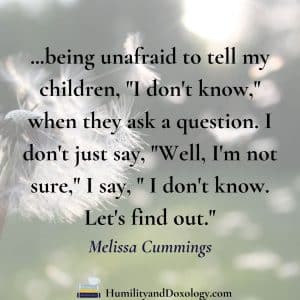
Paideia Northwest Education Conference
Melissa, I know that you have, as I mentioned in your bio, you have started this lovely conference up in the Pacific Northwest, so can you tell a little bit about the story of– I mean, that’s just amazing to me. That’s so brave to start something like that. That’s so cool. Tell me, when you did it, why you did it, what are some of your goals with your conference?
Melissa: Yes, and actually that’s a way, I guess, also, that I pursued furthering my education. I bring the teachers to me. A few years ago in 2018, I had realized I had never been to any education conference except as a child. We would go to history conferences, which you and I talked about but since being a homeschooling parent, there’s nothing in my area. There are no great homeschool conventions. There are no Charlotte Mason conventions, there’s no Wild + Free, all these different things that I would hear about but were not nearby.
As a homeschooling mom, with a single income household, I don’t have the time, or the money, or the luxury to just jet around the country to attend things, to learn and to grow in my skills as a homeschooling mom, or just to connect with other moms doing the same thing. I had asked some friends that had homeschooling, or even just classical education connections, can we do something in the Spokane area, the Eastern Washington area, because occasionally, right on the coast in Portland or Seattle, there are some events over there, but that’s a plane flight for me, or a six-hour drive, and it would involve overnights and all those things that make it complicated.
We have a beautifully growing community of Christians in this area, even though historically, this has been a very unchurched area, but the Lord is at work, and there are also a lot more home educators and classical educators as the ACCS has blossomed a bit in our region. I knew there had to be a market, so to speak, a need, a desire for this, so at a book launching in Spokane, where there were some people with connections to the great homeschool convention I asked, “Could we bring GHC to the Spokane area?” They said, “No, I don’t think that’s going to happen,” and I said, “Well, could we recreate a mini version of it?” I was told, ” No, that’s going to take too much, but you could try.”
I thought, “Oh, I don’t know the first thing about it.” A couple of months went by and I ran into a Schole Sisters friend and she said, “I think there really is a need for that. I think you should do it.” I thought, “I can’t. I know nothing about hosting large events. I didn’t even plan my own wedding reception. My mother did, because I was in college.” She said, “Well, just take it to the Lord and see what he can do.”
Three months later we had our first event, and there were 250 women. I brought in speakers, and the Lord provided the financial means. He worked out all the details, and we’ve had three years of events so far, and this year is planned, and next year is planned, so He’s just really– He’s blessing the little basket that I could bring, and multiplying it for the people who attend, and it’s encouraging to see that it is not my baby, but it’s His. Because I don’t know what I’m doing and I don’t have the connections, or I’ve never even been to another education conference to compare with it. I’m just shooting from the hip and asking Him to do the work and He does. He’s very faithful.
Amy: What an encouraging and God-honoring story, just to hear how the Lord worked, and did this thing and be able to glorify Him in that. I hope that it’s an encouragement for any mama who’s listening, who’s maybe seen on social media, the people going to the conventions or, “Oh, well my friend in this other area has this great local co-op, or this great local community and she’s feeling discouraged because she just doesn’t have that where she is.” Let this be an encouragement.
You never know, you could start something, and you don’t have to already have all this experience, or all this expertise, or all these connections. If you have that desire that the Lord has given to you, to take it to Him and see what He could do. That’s just such an encouragement and really exciting, but I have to laugh to what you said about lifelong learning, bring the speakers to me. I really think that’s why I started this podcast, so I can just talk to cool people. It’s pretty great.
Melissa: I think one of the other things that has been interesting with, particular with Paideia Northwest is people will ask me, “Is it a homeschooling conference?” I’ll simply ask them, “Well, do you think it is?” Because our lowest common denominator is not a particular method of education. Probably 80% of the speakers and the attendees are home educators, but there’s a percentage that are not. I purpose to have at least one non-homeschooling speaker present each year, and encourage moms who have their kids in day schools, or we’ve had some moms who their children aren’t yet old enough for school age technically, and we’ve had a couple of empty-nesters attend, too.
Just realizing that the lowest common denominator for us is our purpose to raise kids for Christ in His nurture and admonition. It’s not a method, it’s the principle of bringing our children through their education for Him, and for His glory. That’s been a really beautiful thing– again, not relying on those boxes of categories, but just learning from one another and facilitating fellowship between different methods, and seeing we have so much to learn from one another.
Amy: I love that. I think that’s such an important perspective to bring to, not only the homeschooling world, but just the Christian mom world as well.
What Melissa is reading lately
Well, I am asking all my guests two questions at the end here, Melissa, so I’m going to ask you them. The first one is just, what are you reading lately?
Melissa: What am I not reading lately, is really the thing. Actually, I pulled this out. I love Elisabeth Elliot and I recently read, Let Me Me a Woman. I thought I had read everything by Elisabeth Elliot, but my friend Abby told me a couple of months ago, that I should check this one out and it’s just lovely. Have you read it?
Amy: I think I read that in high school, but it has been a while. I do not remember many details.
Melissa: Written from a mother, Elisabeth to her daughter on the occasion of her daughter’s wedding, her marriage, at the outset. Of course, Elisabeth didn’t have a long marriage. She specifically said in– I think it was in the introduction, that she didn’t have a lot of marriage experience to write about or to share, but she had a lot of experience with being a Christian woman. As her daughter was getting married, she was trying to encourage her to remember that she is still first and foremost, a daughter of the King, and one of the ways she gets to express that is through her marriage and then Lord-willing, through motherhood, but the ideas that are in let me be a woman are rather counter-cultural for us right now.
Embracing femininity, and also just embracing femaleness, unabashedly, unashamedly, being grateful for the ways that God has created us as female, what that means for our bodies, our hormones, our emotions, our spirituality. It’s beautiful. That was a really encouraging read for me recently, but then I’ve also been– I know April is National Poetry Month but I spent the month of March in poetry, because I didn’t plan ahead very well, I think, and so I’ve been enjoying a lot of poetry. This was my stack of poetry for the month of March. [laughs]
Amy: Oh, that’s fantastic.
Melissa: Amy Carmichael and Jason Farley and Ben Palpant and Joseph Carlson, just lots and lots of poetry. Faith-filled poetry. It’s been very good for furthering my education, and building up my love of truth, and goodness, and beauty, because there’s nothing like poetry to do that.
Amy: Really any month. Yes, any month can be poetry month.
Melissa: Yes, so it was March for me.
Amy: Those look like some fantastic ones. Maybe you can send me some of those authors and titles, and I’ll put those in the show notes when this episode goes live.
Melissa: Yes, I can do that.
Current read aloud: Strays by Remy Wilkins (Canon Press)
My recent read: Let Me Be a Woman by Elisabeth Elliott
My current poetry read: Mountain Breezes by Amy Carmichael
My recent poetry stack: The Whirlwind Bides His Time by Joseph Carlson; The Lay of Creation by Joseph Carlson; The Lay of Redemption by Joseph Carlson; No One Doubts a Belly Laugh by Jason Farley; Twenty Wild Decembers by Jason Farley; Sojourner Songs by Ben Palpant; The Stranger by Ben Palpant
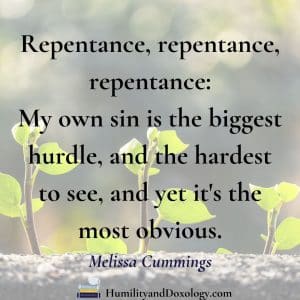
Melissa’s best tips to help the homeschool day run smoothly.
Amy: The final question I have for you is just what are your best tips for a homeschool day run smoothly?
Melissa: Repentance, repentance, repentance. My own sin is the biggest hurdle, and the hardest to see, and yet it’s the most obvious. Repenting of my blindness to my own faults that are just sprinkled everywhere. Repentance of my desire to control. Repentance, trying to encourage my children to see their sins before I see mine, that log versus the splinter. Repenting of my laziness, wanting to sit with my cup of coffee, and linger over my own book at a time when the next best thing, the next right thing is actually to put down the coffee cup and the book and go change the diaper, go wash the dish, come alongside the burgeoning teenager, who needs a reminder on what feel masculinity is.
Yes, repentance, it’s a practice that I’m thankful sanctification is a lifelong process, because it’s a practice that is not going away soon. I have a lot of time, God-willing, to keep at that practice and grow in it. Repentance.
But I think also, a warm drink, a good read-aloud, and a bowl of popcorn. It’s the best way to gather the children, and remind one another, not just them, but to remind myself also, that we’re all on the same team. We’re on the same side. We’re fighting the same dragon, because we all belong to the King. I think that’s my best. That’s my best tip from experience, at least. I have a lot left to learn and I’m excited to continue down this journey.
Amy: Well, I think that is a very encouraging and gospel, grace-filled reminder here. As we come to the end of our conversation, Melissa, this has been so fun to get to chat with you. Can you tell people where they can find you all around the internet?
Find Melissa Cummings Online
Melissa: Yes. I blog occasionally at joyfuldomesticity.com about faith and family, and you can find me at Paideia Northwest. Pie, as in eat yummy thing, and day as in what, a beautiful day, and then A thrown in for good measure, so paideianorthwest.com or on Instagram. During the conference season of August through November, you can find me on Facebook, but otherwise I’m on Instagram and the website. We also hang out @sacredpsalmody on Instagram, where we share our psalm of the month, and how we as a family pursue that practice of singing the psalms together.
Amy: I will have links to all of those things over in the show notes for this episode at www.humilityanddoxology.com. Talk to you later, Melissa.
Check out all the other interviews in my Homeschool Conversations series!
